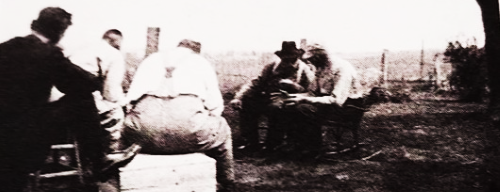On sunny Sundays, with a soft breeze blowing and leisure in the land, the men of my family met for a solemn ritual conducted with very sharp knives. There was some talk, but mostly muttering. The schick, schick, schickering of wood yielding to steel murmured a sound-track of earnest work, meditatively attended.
The schickering stillness echoed the seriousness
of the ritual.
Great-Grandpa Hamilton, Grandpa Joe Shipley, and assorted cousins.
They were farmers. Sharp pocket knives are to farmers as scalpels are to surgeons. Both surgical and agricultural operations rest on sharp edges of steel.
A thousand jobs on farms and operating tables depend upon precision-honed blades.
Farmers took pride in their skill with a whetstone.
It was a necessary talent to hone. Country folks in the years before the mid-twentieth century were seriously serious about the practical value of a sharp pocket-knife.
Something else mattered too; less discussed because already deeply understood: a man who knew how to sharpen a knife to razor edge was a man to be respected.
Razor sharpness wasn't really needed for most jobs. The fascination with sharpness wasn't practical, it was aesthetic. I doubt any of my Grandpas, uncles or cousins ever thought of anything as a matter of aesthetic consideration.
They didn't use the word. They did value the artistry it takes to whet steel to surgical sharpness.
That's what made the Sunday whitlin' serious. Whatever they whittled revealed skill and keenness
of blade. It was there for all to see.
My forbearers were masters.
I'm not.
